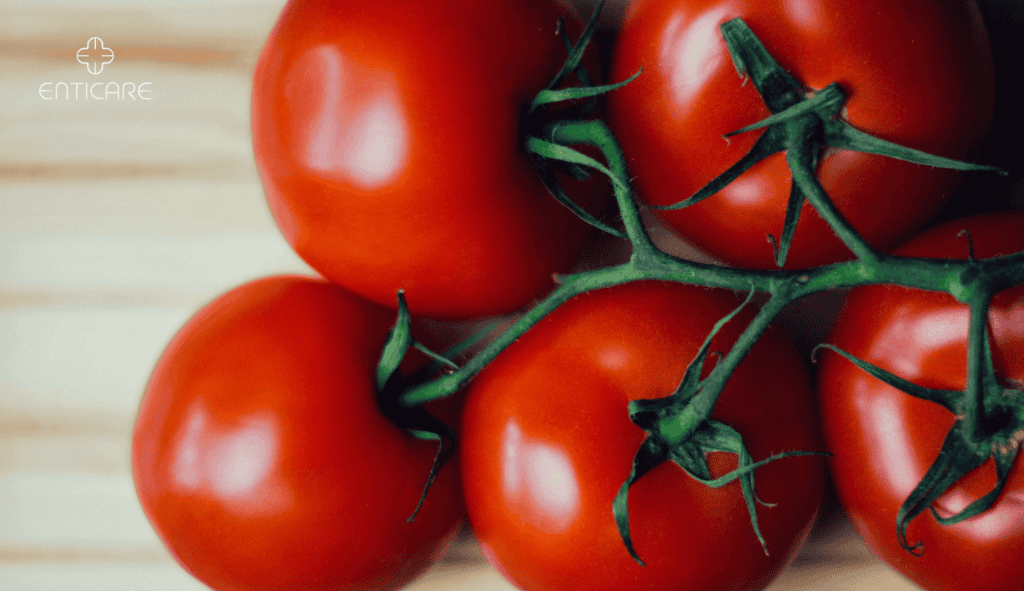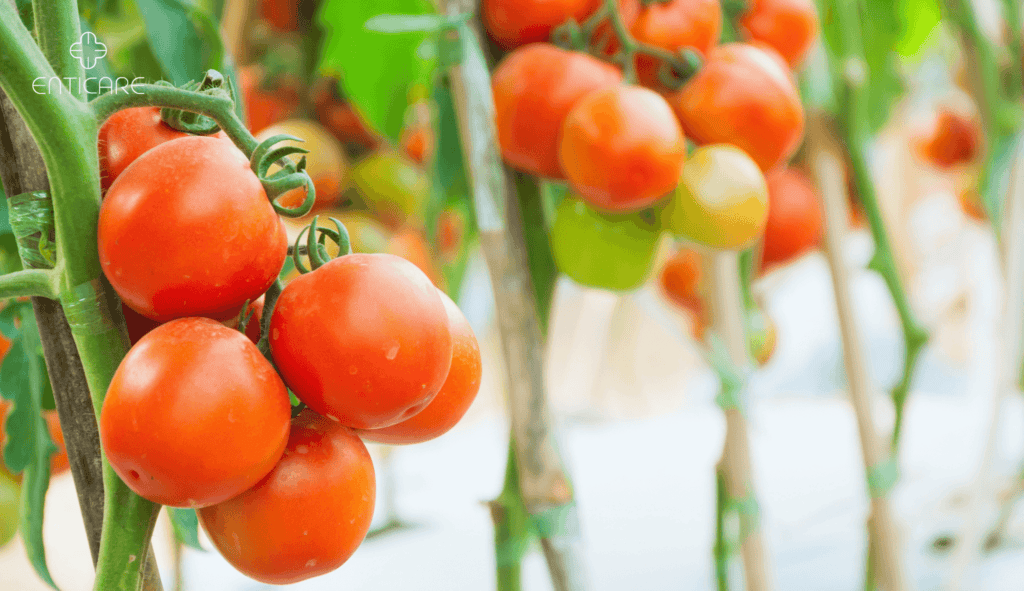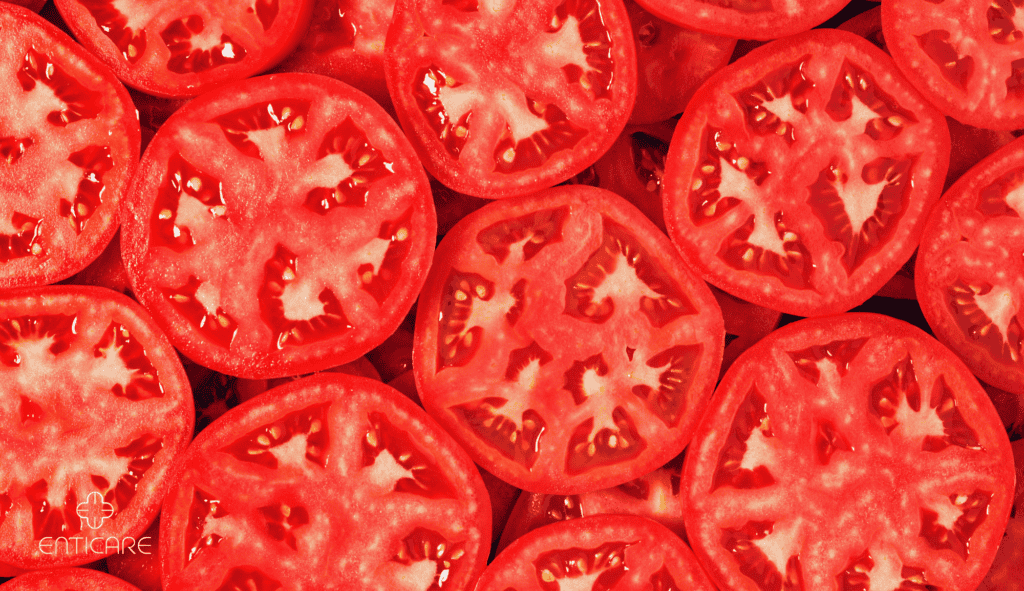Tomatoes are a staple in many diets around the world, but for some, they cause more harm than good. If you’re experiencing discomfort after eating tomatoes, you may have a tomato allergy. This article breaks down everything you need to know about tomato allergies, including common symptoms, causes, foods to avoid, and prevention strategies.

What Is a Tomato Allergy?
A tomato allergy occurs when your immune system mistakes proteins in tomatoes for harmful substances and reacts against them. Although not as common as other food allergies, a tomato allergy can still cause uncomfortable or even dangerous symptoms. Recognizing these symptoms early and taking steps to manage the allergy can help you avoid future issues. Additionally, some individuals may experience oral allergy syndrome (OAS), where consuming tomatoes leads to symptoms like an itchy mouth due to cross-reactivity with pollen allergens.
How the Immune System Responds to Tomatoes
- The immune system identifies certain proteins in tomatoes as harmful and releases histamines to counteract them.
- This reaction can range from mild symptoms to more severe allergic responses like anaphylaxis, potentially leading to a severe allergic reaction.
Is It an Allergy or Intolerance?
- It’s important to differentiate between an allergy and an intolerance. Allergies involve the immune system, while intolerances, like a tomato intolerance, affect the digestive system without immune involvement.
Cross-Reactivity with Other Nightshades and Oral Allergy Syndrome
- If you’re allergic to tomatoes, you may also react to other nightshade plants, such as potatoes, eggplants, and peppers. This is known as cross-reactivity, where similar proteins in different plants trigger a similar immune response.
Common Symptoms of Tomato Allergy
Tomato allergy symptoms can manifest in various ways, and the symptoms may vary depending on the severity of the allergy. It’s crucial to recognize these signs so you can take the necessary actions.
Skin Reactions
- Common skin symptoms include rashes, itching, hives, or swelling, especially around the mouth after consuming or touching tomatoes.
- In some cases, contact dermatitis can occur, causing redness and irritation when tomatoes come into contact with the skin.
Respiratory Symptoms
- Sneezing, nasal congestion, coughing, or wheezing are common respiratory responses for those allergic to tomatoes.
- In more severe cases, swelling of the throat or tongue can occur, which requires immediate medical attention.
Gastrointestinal Issues
- People with tomato allergies may experience nausea, vomiting, or diarrhea shortly after consuming the fruit.
- Abdominal pain and cramping may also occur as a result of the allergic reaction within the digestive tract.
Causes and Risk Factors
Tomato allergy is a complex condition influenced by a variety of factors, including genetics, lifestyle, and diet. Understanding these can help you better manage and prevent allergic reactions.
Genetic Predispositions
Genetics play a significant role in the development of tomato allergies. If you have a family history of allergies, particularly pollen food allergy syndrome (PFAS), you may be more susceptible to developing a tomato allergy. Research has identified specific genetic markers, such as variants in the HLA-DQB1 and HLA-DRB1 genes, that are associated with an increased risk of food allergies, including those to tomatoes. This genetic predisposition means that your immune system is more likely to mistake tomato proteins for harmful substances, triggering an allergic reaction.
Lifestyle and Dietary Influences
Your lifestyle and dietary habits can also contribute to the development of a tomato allergy. Consuming large amounts of tomatoes or tomato-based products regularly may increase your risk. Additionally, significant changes in your diet or a history of eating disorders can make you more susceptible to developing food allergies. For instance, if you suddenly start eating a lot of tomatoes after not consuming them for a long time, your immune system might react negatively. Being mindful of your dietary habits and making gradual changes can help mitigate this risk.

Foods to Avoid with a Tomato Allergy
Living with a tomato allergy can be tricky, especially since tomatoes are a common ingredient in many dishes. Being aware of hidden tomato sources and alternative food options can make managing your allergy easier.
Obvious Sources of Tomatoes
- Foods like fresh tomatoes, tomato sauce, ketchup, and salsa should be avoided if you have a tomato allergy.
- Dishes such as pasta, pizza, and many salads often contain tomatoes as a key ingredient.
Hidden Tomato Ingredients
- Tomatoes often appear in unexpected places, such as soups, stews, and even some salad dressings or processed snacks.
- Reading labels carefully is essential. Look for ingredients like “tomato paste,” “tomato concentrate,” or “natural flavors,” which may indicate the presence of tomato-derived substances.
Safe Alternatives to Tomatoes
- Replace tomatoes with safe alternatives, such as roasted red peppers or pumpkin puree, to replicate the rich texture and flavor of tomatoes.
- Consider using vinegar or lemon juice to add acidity to dishes where tomatoes are typically used.
How to Diagnose a Tomato Allergy
Proper diagnosis of a tomato allergy can ensure that you receive appropriate treatment and management advice. If you suspect a tomato allergy, consulting a medical professional should be your first step. Proper identification is crucial to prevent severe allergic reactions, which can occur due to specific proteins in tomatoes.
Allergy Testing
- Skin prick tests and blood tests are commonly used to confirm a tomato allergy. These tests reveal whether your immune system reacts to specific tomato proteins.
- A skin prick test involves placing a small amount of tomato extract on the skin and pricking the area to see if a reaction occurs.
Food Elimination and Challenge Diets
- An elimination diet can help determine if tomatoes are the cause of your symptoms. Remove tomatoes from your diet for a set period, then gradually reintroduce them under medical supervision to see if symptoms return.
Consulting an Allergist
- An allergist can guide you through the diagnostic process, including testing and interpreting results. They can also recommend treatment options to manage your allergy.

Managing and Preventing Tomato Allergy Reactions
Once you know that you have a tomato allergy, you can take steps to prevent allergic reactions and manage symptoms if they occur. A combination of avoidance, medication, and preparedness can help you stay safe. Tomato allergy treatment typically involves avoiding tomatoes, using antihistamines for mild reactions, and having emergency medications like epinephrine auto-injectors for severe cases.
Avoidance Strategies
- The most effective way to prevent an allergic reaction is to avoid tomatoes and tomato-containing products entirely.
- When dining out, communicate your allergy clearly to restaurant staff and ask about the ingredients in the dishes you’re ordering.
Antihistamines and Emergency Medication
- Over-the-counter antihistamines can help alleviate mild symptoms, such as itching or swelling.
- For severe reactions, including more serious allergic reactions that could lead to anaphylaxis, carrying an epinephrine auto-injector (like an EpiPen) may be life-saving. Be sure to know how to use it in case of an emergency.
Staying Prepared for Emergencies
- If you have a history of severe reactions, create an emergency action plan. Make sure your family, friends, and coworkers know how to respond if you have an allergic reaction.
- Wear a medical alert bracelet that identifies your tomato allergy, which can help first responders provide appropriate treatment in case of a severe reaction.
Take Control of Your Allergy Health
Dealing with a tomato allergy can be challenging, but it’s manageable with the right knowledge and preparation. Recognizing the symptoms, avoiding trigger foods, and working with an allergist can help you live comfortably without the fear of allergic reactions.
If you suspect you have a tomato allergy or need help managing your allergy symptoms, don’t wait. Schedule an appointment with our specialists at Enticare today to get the care you deserve.

